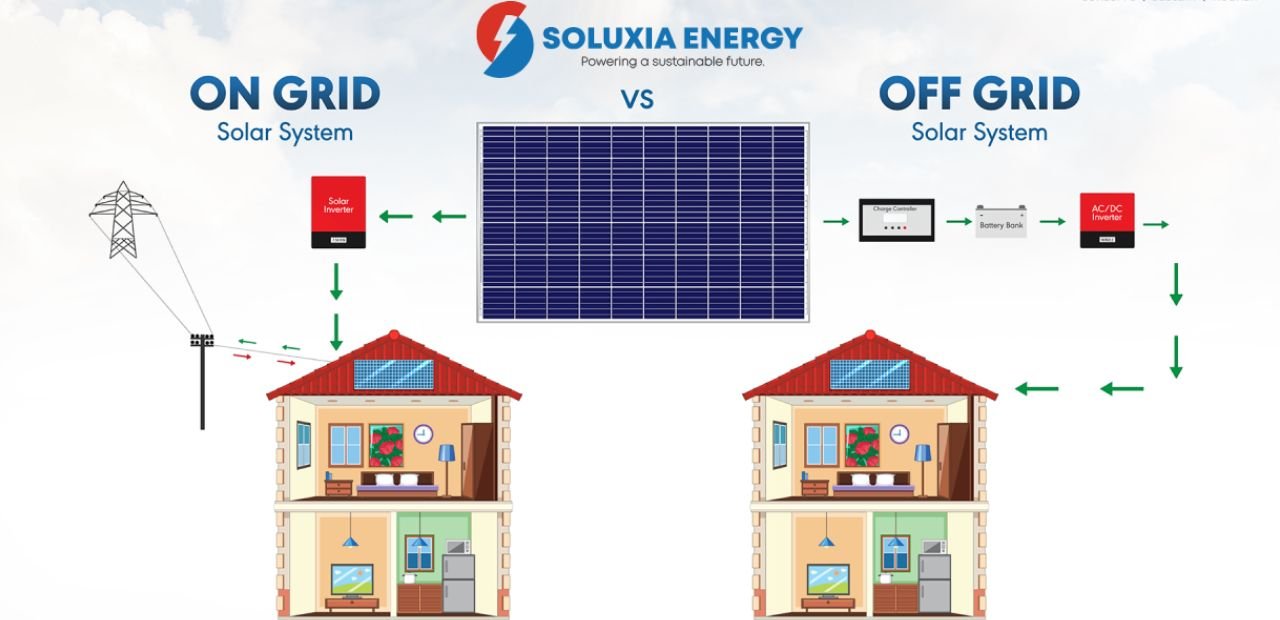On-Grid vs Off-Grid Solar Systems in Pakistan: Which One Suits You
On-Grid vs Off-Grid Solar Systems in Pakistan: Which One Suits You
Blog Article
 When considering solar energy solutions in Pakistan, understanding the differences between On-Grid and Off-Grid Solar System Pakistan is crucial. Each system offers unique advantages tailored to specific needs, budgets, and locations. Here's a comprehensive guide to help you make an informed decision.
When considering solar energy solutions in Pakistan, understanding the differences between On-Grid and Off-Grid Solar System Pakistan is crucial. Each system offers unique advantages tailored to specific needs, budgets, and locations. Here's a comprehensive guide to help you make an informed decision.
???? On-Grid Solar Systems
Definition:
An on-grid solar system, also known as a grid-tied system, is connected to the national electricity grid. It generates electricity from solar panels and supplies it to your home. Any excess power produced can be fed back into the grid, often resulting in credits on your electricity bill through net metering.
Key Features:
-
Cost-Effective: Eliminates the need for expensive battery storage.
-
Net Metering: Allows you to sell excess electricity back to the grid, reducing overall energy costs.
-
Continuous Power Supply: Relies on the grid for power during periods when solar generation is insufficient, such as at night.
-
Lower Initial Investment: Generally more affordable due to the absence of battery storage.
Ideal For:
Urban and suburban areas with reliable grid access, where electricity tariffs are high, and the goal is to reduce monthly energy bills.
???? Off-Grid Solar Systems
Definition:
An off-grid solar system operates independently of the national grid. It includes solar panels, a charge controller, batteries for energy storage, and an inverter. This system is designed to meet all your energy needs without relying on external power sources.
Key Features:
-
Energy Independence: Provides a reliable power supply in areas with frequent power outages or no grid access.
-
Battery Storage: Stores excess energy for use during periods without sunlight, ensuring a continuous power supply.
-
Higher Initial Cost: Requires investment in batteries and additional equipment, leading to higher upfront costs.
-
Maintenance: Batteries require periodic maintenance and eventual replacement.
Ideal For:
Rural areas, remote locations, or regions with unreliable or no grid access, where a self-sufficient power supply is essential.
⚖️ Comparison Table
| Feature | On-Grid Solar System | Off-Grid Solar System |
|---|---|---|
| Grid Connection | Yes | No |
| Battery Storage | Optional (for backup) | Essential |
| Net Metering | Available | Not applicable |
| Initial Cost | Lower | Higher |
| Maintenance | Low | Moderate to High |
| Energy Independence | Partial | Complete |
| Best For | Urban/Suburban Areas | Rural/Remote Areas |
???? Cost Considerations
-
On-Grid Systems: The cost typically ranges from PKR 100,000 to PKR 200,000 per kW, depending on the quality of components and installation complexity.
-
Off-Grid Systems: Prices can vary significantly based on capacity and battery storage requirements. A basic system might cost between PKR 50,000 and PKR 100,000, while larger setups can exceed PKR 300,000.
✅ Conclusion
Choosing between an On-Grid and Off-Grid Solar System in Pakistan depends on your specific energy needs, location, and budget:
-
On-Grid Systems are ideal for urban areas with reliable grid access, aiming to reduce electricity bills through net metering.
-
Off-Grid Systems are suited for rural or remote areas lacking grid infrastructure, providing complete energy independence.
Assess your requirements carefully to select the system that best aligns with your energy goals and financial considerations.
Report this page